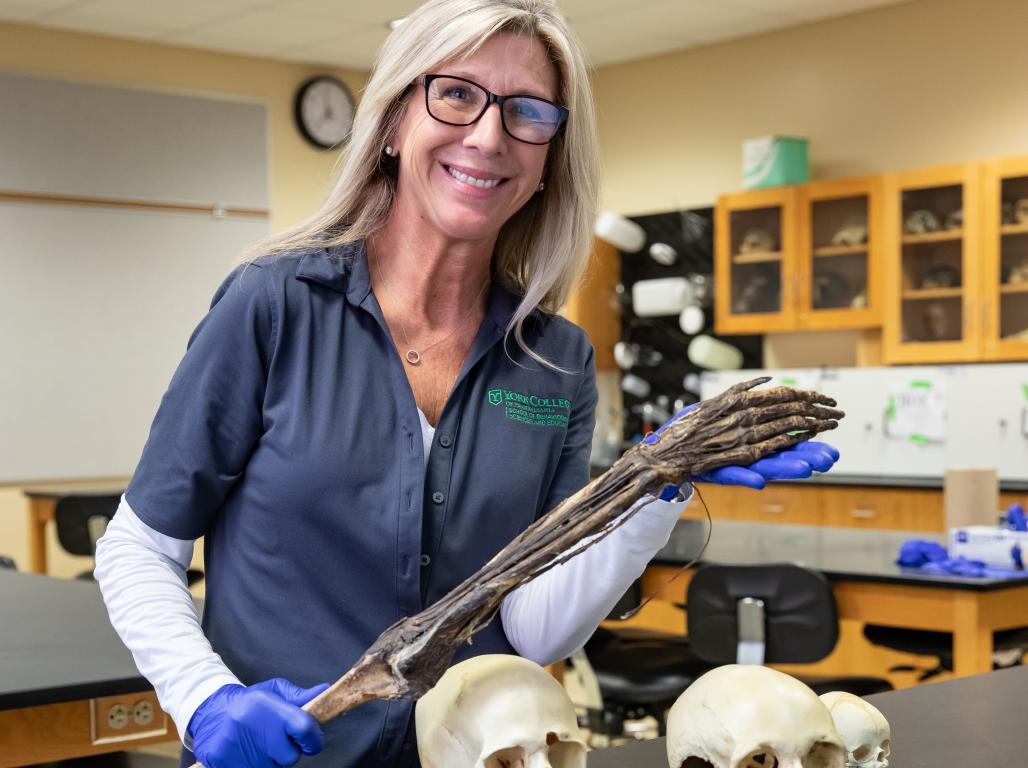Criminology and Criminal Justice


Prepare for a rewarding career that supports your community.
A bachelor’s degree in Criminology and Criminal Justice does more than prepare you for a future in law enforcement. You’ll learn about the causes of crime, as well as ways to help reduce law-breaking. You’ll explore ethical codes of behavior and the legal frameworks that guide professionals in this high-demand field.
The Criminology and Criminal Justice program at York College is led by expert faculty with a variety of specializations. As a student, you’ll have the flexibility to focus on the areas that interest you most, including cybercrime or forensics.
Discover how your passion for understanding human behavior can grow into a career path that allows you to make a difference. It all starts with a criminal justice degree from York College.
About the Bachelor of Science in Criminology and Criminal Justice
Our criminal justice degree program includes a variety of required classes, electives, and experiential learning opportunities. These include:
- CJA 234: Law Enforcement
- CJA 302: Criminal Law
- CJA 310: Victimology
- CJA 336: Judicial Process
- CJA 396: Criminal Justice Statistics
- CJA 378: Criminology
Careers in Criminal Justice and Criminology
A career in criminal justice provides you with a number of options.
Many graduates of the York College Criminology and Criminal Justice program have gone on to work in law enforcement, for state and municipal agencies, or for probation and parole departments. Some work for Homeland Security, Lockheed Martin, or the Federal Bureau of Investigation (FBI). Others have gone on to pursue further education at prestigious law schools and top-level graduate programs.
A degree in criminal justice could lead to job titles such as:
- Crime scene investigator
- Drug enforcement agent
- Corrections officer
- Homicide detective
- Crime prevention specialist
- Victim advocate
- Probation officer
Criminology and Criminal Justice Salary
How much will you earn as a criminal justice professional? The U.S. Bureau of Labor Statistics (BLS) reports that probation officers and correctional treatment specialists earn a median salary of $55,690 per year. Police and detectives earn about $67,290 per year, and many also have the option to retire earlier than the typical retirement age.
Benefits of a Criminal Justice Degree
Why choose a criminology degree? The BLS says that demand for police and detectives is rising by 5% each year. You’ll also give back to your community by preventing crime, protecting others, and ensuring justice.
No matter which career path you choose, we’ll help you excel before, during, and after your job search.
Experiential learning — the hands-on approach that gets you real-world experience — is invaluable in this field. That’s why we require criminology and criminal justice majors to complete an internship before graduation, and offer research project opportunities where you’ll work directly with a faculty member.
Criminology and Criminal Justice Internships
Internships give you a view of the system that can’t be taught in a classroom. York College students have found internships with juvenile and adult detention facilities, the district attorney’s office, security firms, and crime labs. The program also maintains close ties with many local organizations that provide services to crime victims, juveniles, and others in the local community. Through these connections, criminal justice majors are able to gain valuable career experience and, often, specialized training.
Students are eligible for internship placement once they have successfully completed 60 credit hours, with a minimum 2.5 GPA. Criminal justice internships are posted on Handshake.
Research Projects
Research projects provide students with the opportunity to practice in-depth analysis as they work one-on-one with a faculty member. York College students have helped professors study determinants of the fear of crime and satisfaction with police, evaluate date rape prevention programs, organize career days, conduct community surveys, and more.
In the past, York College student research has resulted in professional publications or presentations.
At York College, we pride ourselves on our community-oriented campus, with faculty members who are committed to helping students be successful. Criminology and Criminal Justice majors will have opportunities to conduct research alongside faculty experts. You’ll also network with prospective employers and build connections that could last your entire career.
For students interested in pursuing a career in law, or attending law school after earning their bachelor’s degree, the student-run Pre-Law Society may serve as an ideal way to get involved on campus. The York College campus is also home to a number of honor societies, non-academic clubs and organizations, the Campus Activities Board (CAB), and student government.
Our B.S. in Criminology and Criminal Justice:
- Provides students with a comprehensive overview of the criminal and juvenile justice systems
- Encourages theoretical and informed inquiry into justice policies and criminal behavior
- Develops skills in research methodology and statistics
- Prepares students for professional careers in criminology and criminal justice, in addition to providing a foundation for advanced study.
Criminology and Criminal Justice Minor
A minor in Criminology and Criminal Justice provides students with an opportunity to study both the adult and juvenile justice systems. The causes of crime and victimization are also explored in a variety of courses.
An Accredited Criminal Justice Degree
York College is fully accredited by the Middle States Commission on Higher Education, which accredits schools and colleges in the Middle States region. This includes Delaware, DC, Maryland, New Jersey, New York, and Pennsylvania. Accreditation by one of the six regional accrediting associations in the United States indicates that the school or college has been carefully evaluated and found to meet standards agreed upon by qualified educators.
Criminology and Criminal Justice Courses
Your class schedule will include core courses for your major, Gen Next general education classes, and electives.
| Course Name | Course Code | Credits |
|---|---|---|
| Law Enforcement | CCJ 234 | 3 credit hours |
| Criminal Law | CCJ 302 | 3 credit hours |
| Victimology | CCJ 310 | 3 credit hours |
| Judicial Process | CCJ 336 | 3 credit hours |
| Criminology | CCJ 378 | 3 credit hours |
Careers in Criminology and Criminal Justice
A bachelor’s degree in Criminology and Criminal Justice opens up a variety of career opportunities. Some of your options may include:
Crime Scene Investigator
Drug Enforcement Agent
Corrections Officer
Homicide Detective
Crime Prevention Specialist
Victim Advocate

Build your dream career, one day at a time.
This is day one. From your first semester on campus through graduation day, York College offers expert advice, professional development opportunities, and personalized support to help you navigate the choices that influence your future.
Explore resources for a successful college experience:
Meet the Faculty
View All FacultyCriminology and Criminal Justice in Action
View All NewsRelated Programs
Cybersecurity Management
Cybersecurity is one of the fastest growing career fields in the country, and for good reason. The livelihood of today’s organizations — from private businesses to publicly traded companies, healthcare providers to government agencies — depends on their protection of digital information and prevention of cyberattacks.
Forensic Chemistry
The criminal justice field involves more than police officers and lawyers. Forensic chemists also play an important role in investigations. They specialize in analyzing evidence, and they use scientific processes to draw conclusions about a crime.
Intelligence Analysis
When it’s time to make important decisions, policymakers turn to their information analysts for assistance. Analysts play a key role in collecting complex data, evaluating sources, and making timely, non-biased assessments. Their job is essential to the process of developing policies — and the impact of their work is felt on an international level.








